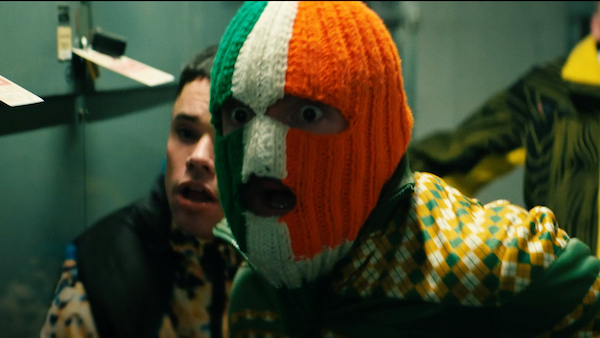Film Review: Tongues Are Untied in “Kneecap”
By Peter Keough
A frenetic, funny, foul-mouthed, and sometimes facile testament to the fact that language matters.
Kneecap. Directed by Rich Peppiatt. Screens at the Alamo Drafthouse Seaport, the AMC Boston Common 19, the Somerville Theatre, and the suburbs beginning August 1.

A scene from Kneecap.
From gender pronouns to Ukrainian place names, language matters. Or as Arlo Ó’Cairealláin (Michael Fassbender) proclaims in Rich Peppiatt’s frenetic, funny, foul-mouthed, sometimes facile Kneecap, “Every word spoken in the Irish language is a bullet fired for Irish freedom.”
Unfortunately, when it comes to bullets, Arlo is not speaking just metaphorically. An IRA militant in Northern Ireland (a whimsical montage shows his car bombings), he has faked his death and has gone on the lam, taking up a new identity as a yoga teacher. He leaves in the lurch his depressed, agoraphobic wife, the aptly named Dolores (Simone Kirby), his son Naoise (Naoise Ó Cairealláin), and his son’s best friend Liam (Liam Óg Ó Hannaidh). As a parting gift, perhaps, dad has taught the two boys their native tongue while leaving them a traumatic legacy of violent revolution and ongoing police surveillance and harassment.
Years pass (the film is set in 2017) and, unsurprisingly, Naoise and Liam have embraced an anarchic, criminal, and drug-addled lifestyle supplemented by nascent ambitions to become rappers in the Irish language. Meanwhile JJ (JJ Ó Dochartaigh), a wannabe musician and a teacher at an Irish language school, is frustrated with textbooks offering model phrases like, “the girl cut turf in the rain.” Then one evening he is reluctantly enlisted by the police to serve as a translator for an Irish-speaking prisoner who turns out to be Naoise. In the course of the interrogation JJ gets a hold of Naoise’s notebook which contains (in addition to several sheets of blotter acid) lyrics to Naoise and Liam’s politically charged and obscene rap lyrics.
Something that could be used to get the kids more excited about studying Irish, perhaps. But JJ is more ambitious than that. After another prickly meet-cute he convinces the two talented wastrels to join him in his makeshift garage recording studio where they put together killer tracks while getting wasted. But JJ has to keep this new vocation on the down-low; not just from the people at school but from his straitlaced partner Caitlin (Fionnula Flaherty), who is also an activist for Irish language rights (along with Dolores, the women in this film tend to be kind of a drag). No easy task after she finds him passed out in his own piss in the garage.
The two others also want to keep a low profile for their own reasons (threats from a splinter group called Radical Republicans Against Drugs among them). So, when they start performing in public, they do so under stage names with JJ wearing a tricolor balaclava.
The act is a hit with everyone except such sticks-in-the mud as the police, the IRA, the Irish language movement, and everyone else in any position of authority. It’s not just the bad rap called forth by their genre of music, or even the violence and obscenity of the lyrics. It is the band’s unapologetic advocacy of drug use from marijuana to purloined prescription pills to cocaine and, of course, the traditional standbys of booze and Guinness. As Caitlin puts it diplomatically, “You have to consider who is best to represent the language.” It could be that the naysayers have a salient point, given the heavy toll drug use has taken over the years in Northen Ireland.
Be that as it may, these complications are dealt with whimsically — the comedy varies in tone from very black to very farcical as demonstrated by the name the group has chosen for itself. Based on the real-life rap group of the title and starring the actual members in loose versions of themselves, the film has been compared by some to Alan Parker’s The Commitments (1991) and in style to Danny Boyle’s Trainspotting (1996). I lean more to a hard-R-rated version of Richard Lester’s Beatles movies myself, not so much A Hard Day’s Night (1964) as Help! (1965). Like the latter, Kneecap fancies far-fetched capers in its plotting along with goofy stylistic flourishes — the latter ranging from handwritten subtitles translating the Irish lyrics into English to Claymation hallucinations for when the ketamine kicks in.
All is puns and games, however, until the name of the band gets literally enacted in a bloody alley. Arlo’s pairing of ballads and bullets might seem inspiring to some, but while the former can stir the spirit, the latter only lay waste to the flesh.
Peter Keough writes about film and other topics and has contributed to numerous publications. He had been the film editor of the Boston Phoenix from 1989 to its demise in 2013 and has edited three books on film, most recently For Kids of All Ages: The National Society of Film Critics on Children’s Movies (Rowman & Littlefield, 2019).
